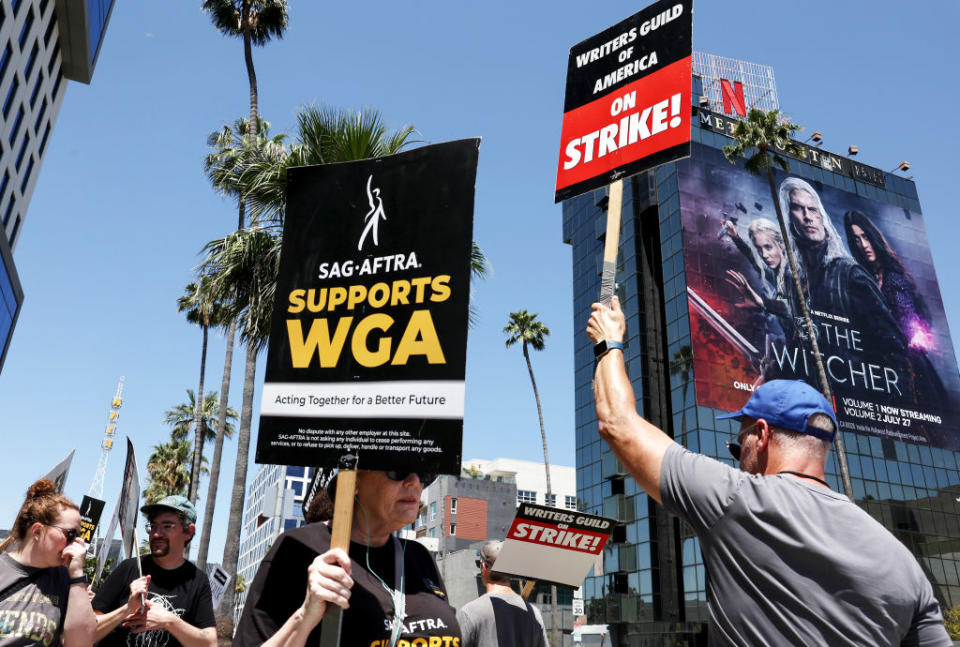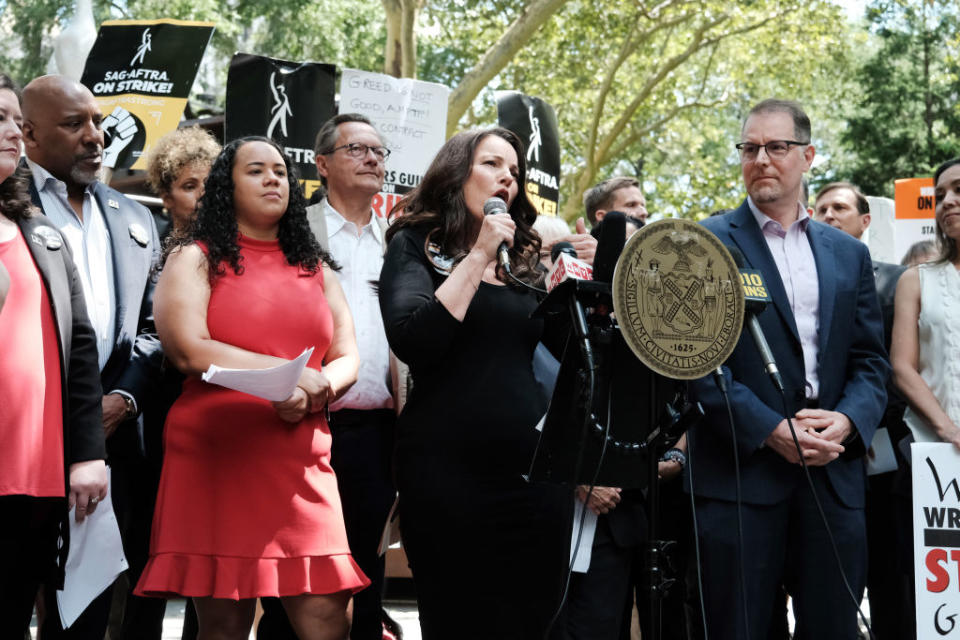What to Watch: Dual Strikes Come at an Inflection Point for Hollywood

The industry is in the midst of the first concurrent writers and actors strike in more than 60 years — 11,500 WGA members began walking picket lines on May 2, while the 160,000-member Screen Actors Guild and American Federation of Television and Radio Artists walked off the job on July 14.
The dual work stoppage has effectively made Hollywood a tumbleweed festooned desert with top actors unable to promote long-in-the-can projects at film festivals or appear at awards shows — resulting in almost a total suspension of the red carpets that are now so vital to the luxury and fashion worlds. The 75th Primetime Emmy Awards, which were originally scheduled for Sept. 18, have been postponed until January.
More from WWD
Amal Clooney Embraces Romantic Style in Lace Dress for DVF Awards 2023 With George Clooney in Venice
Director Luca Guadagnino’s “Challengers,” which stars Zendaya, was pulled as the opening night attraction at the Venice Film Festival, which runs through Sept. 9. The fest will go on: some actors appearing in independent films can participate in the festival care of interim agreements exempting them from the strike ban on promotional appearances and Giorgio Armani will stage a couture runway show during the fest that is expected to draw a slew of celebrities. But “Challengers” will now premiere in April 2024, assuming the SAG strike has been settled by then.
The implications, however major for the entertainment industry, also are significant for the fashion world. Film and award show red carpets have become vital marketing vehicles for luxury fashion, beauty and jewelry brands as the stars — and their stylists — have used their social followings to promote the looks they are wearing, usually in return for a hefty paycheck. With fashion weeks approaching, it will be interesting to see how many actors turn up in front rows in New York, London, Milan and Paris, and if brands are willing to pay them to do so if there are no projects to promote. (Meanwhile, stylists in the U.K. have also stepped up their labor activism, forming a union to fight for better pay from brands.)
But movies are far from the biggest game in town any longer, thanks to the quality now being put out on television. There, the work stoppages will result in a dearth of new scripted series and more reality and news programming that networks have traditionally used as schedule spackle, even if many viewers don’t watch TV on a prescribed timetable anymore. There will also be many, many reruns of scripted series.
NBC has been forced to pull most of its original crime dramas, including its Wednesday lineup of Chicago-set dramas and replace them with unscripted series and reruns, while returning series including the ParamountPlus western “1923,” the fourth season of the Netflix drama “Emily in Paris” and the third season of ABC’s “Abbott Elementary” are among the dozens of shows that have been delayed indefinitely. Fans of HBO’s “Euphoria” – who last saw new episodes of the Zendaya hit way back in early 2022 – will have to wait until 2025 for the third season of the show.

The last SAG strike in 1980 — which included 67,000 members and lasted six months — was primarily over residuals for in-home entertainment, in other words, VHS versions of movies and TV shows. The WGA in 2007-08 won residuals for DVDs and what was then called “new media.” But this time, the sticking points for the writers and the actors, including streaming residuals, minimum staffing requirements and guardrails around generative AI, are exacerbated by a painful disruption in the industry’s business model.
The industry is in the throes of a crisis as it transitions from a stable business that relied on linear advertising and the highly profitable cable bundle to streaming video, which relies on consumers paying a monthly premium to a growing batch of streamers. There were more than 100 million U.S. households subscribing to cable television in 2003. Today, there are just over 60 million, according to Statista. And that number is going nowhere but down as consumers avail themselves of the myriad pay and free ad-supported direct-to-consumer offerings. By 2027, Statisa predicts the number of U.S. households subscribing to cable will drop below 50 million.
For the first half of the year, the movie box office was down 21 percent compared to four years ago. The number of releases are also down; AMC Entertainment, the 100-year-old theater chain, is teetering on the edge of bankruptcy.
It’s why media companies have invested so much in direct-to-consumer streaming options. But the streaming stock price bloodbath that kicked off in the first quarter of 2022 — when Netflix revealed its first subscriber loss and Wall Street reacted by sending stock prices of so many revenue losing streamers tumbling — has yet to be stanched. Disney has racked up $10 billion in losses on Disney+ since the service launched in 2019. For the second quarter this year, the service lost 4 million subscribers. Warner Bros. Discovery lost 1.8 million subscribers in the same quarter. Many of them — including previously ad-averse Netflix — have introduced ad-supported tiers in a bid for revenue.
The industry has weathered disruptions, and strikes, in the past. But this work stoppage also has a cultural dimension, which may make it harder to solve. The yawning wealth chasm in America fueled by deregulation and the casino mentality of Wall Street has inflamed tensions between the unions and the studios. There is a reason unions are ascendant in cultural and creative professions. A-list headliners will be fine. But the unions are fighting for the journeymen actors and writers in their ranks who have found it harder to eke out a living in an industry that appears to value its shareholders far more than the people who make its content.
David Zaslav, the current chief executive officer of Warner Bros. Discovery, took home close to $40 million last year; the year before, his salary was an eye-popping $246 million. Yet Warner Bros. Discovery is sitting on almost $50 billion in debt. Bob Iger was paid $27 million annually to return as CEO of Disney after the board ousted Bob Chapek last year.

Fran Drescher, the former “Nanny” star and the voluble president of SAG-AFTRA, has characterized these salaries as “disgusting.”
“At some point you have to say no more,” Drescher told the Associated Press recently. The strike, she said, has “taken on a bigger scope, it’s greater than the sum of its parts. I think it’s a conversation now about the culture of big business, and how it treats everybody up and down the ladder in the name of profit.”
It’s a let-them-eat-cake moment. How the industry’s C-suite titans navigate it will determine the future of Hollywood — and perhaps the red carpet.
Best of WWD


